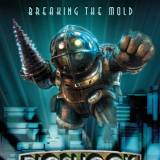A Tale of Three JRPG's (Tales of Vesperia first impressions)
By Atlas 4 Comments
Just a quick check-in on some stuff. I do hope to get this blog up and running regularly, and in the next couple of days I hope to finish writing a new lengthy editorial feature. Should be up here before Wednesday.
I'm really liking Tales of Vesperia. As someone who isn't so deeply absorbed in the strange world of anime, I feel like I can appreciate it from a distance. To come straight to the point, the game looks fantastic. The characters are well designed, but the real star of the show here is the game world. Every setting in the game is wonderfully realised, detailed and lush. Shame then that the monster design is a little generic, but that's a small complaint in the scheme of things.
I keep thinking back to my time with Eternal Sonata, the best JRPG I've played in my life so far, and Tales of Vesperia matches up in some interesting ways. I don't feel like the story in Tales is as engaging; it feels a tad rushed, and merely an exercise to move you from point A to point B. This is subject to change, of course. I will say though that the dialogue is better in Tales, and the game handles humour much more successfully. Neither game is particularly keen on subtlety though, and as beautifully designed and details as the characters are, most of them seem to be stock JRPG characters interchangeable with any number of other characters that have graced the worlds of Final Fantasy or previous Tales games.
Another JRPG that's on my mind at the moment is Lost Odyssey. Now Lost Odyssey was a game that did certain things really well, and as a Final Fantasy-like experience, it was well done. That game did have unique and interesting characters, and a much grittier more down to earth art design. It also had some subtlety, a rare thing in this particular genre. But the pacing was downright bad, the story was pretty poor, it had random battle encounters, which in a game released in 2008 is pretty unacceptable, there was nothing engaging about the combat, and there was too much JRPG grind. I never finished Lost Odyssey, but ironically probably spent more time playing it than I did Eternal Sonata, because it's a much longer game. But Eternal Sonata sacrificed longevity for pacing and fluidity in a really cool way, and Lost Odyssey doesn't so much feel expansive as it does dragged out.
So in thinking of three of the biggest JRPG releases on the Xbox 360 in the past couple of years, one key aspect of each comes to mind; they both are from different schools of JRPG combat. Lost Odyssey's combat was textbook, specifically the "How to Be Final Fantasy" textbook. It was turn-based, slow, strategic and sluggish, but tried to implement a real-time aspect as well. Eternal Sonata's combat was turn-based but in real-time, meaning you had to input your commands quickly and move on to the next player. There was still strategy involved, but it was much more immediate. However when talking about immediacy, Tales of Vesperia is the champ. Tales' combat is completely real-time, and you only control one dude, while others perform their own attack patterns and moves. Strategy is all but thrown out the window, but it does make combat more exciting.
It's fascinating to consider how different the combat in all three of these games is, and to consider what effect the choice has. Lost Odyssey's slow paced methodical combat is the polar opposite to Tales' speed-of-light battles. I feel that Tales of Vesperia's combat suffers in big boss situations, because although they are longer than standard battles, they are still whirlwinds, with little to no strategy involved. Lost Odyssey on the other hand had some excellent boss battles, but paid a massive price. Regular fights against random monsters were painfully drawn out, and whereas Tales of Vesperia fights, counting load screens and victory screens, probably average between 30 seconds and 1 minute, Lost Odyssey's standard battles could take up to 5 minutes, which just destroyed the game's pacing. I think in the scheme of things, the lack of urgency in Lost Odyssey hurt the game more than the brevity of Tales.
So then we come to the middle ground; Eternal Sonata. I think this is the winner in terms of combat mechanics. The blending of turn-based and real-time elements really helped fights feel dynamic and interesting, and while you breeze through low level monsters in a couple of minutes, there were some chunky boss fights that were much more challenging. I also loved how Eternal Sonata changed up the combat as it progressed; you unlocked new levels for your party when you reached certain stages in the game, and they unlocked new abilities and gameplay styles, such as being able to sacrifice length of turns for more attack power. It really helped bring the game to life.
I really hope the immediacy of Tales of Vesperia doesn't do too much to prevent me from enjoying the game, because there are so many cool things about it that I'd hate for one small thing like that to ruin it. I'm not sure how to measure expectations, but I waited nine months to play this game (delayed in Europe), so they were always going to be high. And I'm not helping by comparing it to Eternal Sonata, which is one of my all-time favourite games. But as I said, initial impressions are very good.
